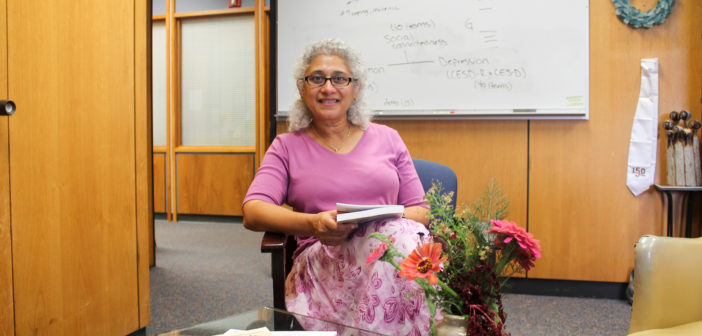When Arpana Inman was a little girl, she wanted to be a flight attendant. She wanted a job that would allow her to help people around the world.
Today, Inman is a counseling psychology professor and the chair of the department of education and human services at Lehigh.
In October, she was selected as the recipient of the 28th annual Janet E. Helms award for mentoring and scholarship.
This year, she also joined 67 female leaders from across the country in the 2017 Higher Education Resource Institute, also known as HERS, a nonprofit leadership academy that provides management development for women in higher education.
“Women’s issues were always something that was very important to me,” Inman said. “I always wanted to do something in those areas, and when I got into the field of psychology, I always looked to learn a little bit more about how to identity politics and psychology issues.”
Inman’s invitation to HERS made an indelible impression on her. She said she became more interested in leadership in higher education, so she decided to attend the 12-day intensive training in Bryn Mawr, Pennsylvania, in July. There, she received training related to different aspects of leadership, such as fundraising, negotiating, bargaining, and addressing issues of diversity and inclusivity on campus.
Inman said this helped her develop methods of understanding issues on different landscapes. She said she learned how to advocate for issues related to education since politicians do not always make the best policy decisions in regards to the field of education.
Inman, along with Bridget Dever, an associate professor of school psychology, contributed to a program that partnered with the nonprofit organization Going-To-School. They helped evaluate certain programs, including one that targets children in specific impoverished communities in India where there are low literacy rates, limited resources and poor education systems.
This program provides opportunities for young adults — ninth-graders in particular —to think about furthering their education by teaching them vocational, technological, entrepreneurial skills and allowing them to think outside the box to enhance their abstract thinking skills. Their hope is for these children to give back to their communities after they receive training.
Inman grew up in India. After high school, she wanted to pursue textile design, but her father urged her to get her bachelor’s degree before attending professional design school. She decided to study psychology.
Although she was always interested in women’s issues, Inman said when she traveled to the United States to pursue a master’s in psychology, she developed an interest in studying other marginalized communities as well.
“I started looking at cross-cultural issues,” Inman said. “I began to experience feelings of otherness when I came to the U.S. that made me more interested in looking at experiences of people of color, different spaces people occupy and the differences in power and privilege.”
Inman’s primary research involves South Asian-Americans, the immigrant experience and how women manage multiple identities.
“My focus has been on how women deal with culture-valued conflicts, how parents help transmit a sense of ethnic identity onto their children, the challenges and struggles that come with managing multiple cultures and within that context, looking at issues of discrimination,” Inman said.
She said she has studied issues of discrimination for first-generation Indian people in the U.S. and will continue to study discrimination for second-generation individuals to evaluate how similarly or differently they cope with discrimination and socialization of discrimination through generations.
Inman’s colleagues say her research is vital.
“Professor Inman’s work has been extremely important in advancing attention to and knowledge of factors related to cultural diversity that impacts on the functioning of individuals and groups in our society,” said George DuPaul, a professor of school psychology. “Her work has advanced understanding and consideration of social justice issues, particularly in relation to individuals from South Asian backgrounds.”
DuPaul said Inman has garnered international respect for her work.
“Not surprisingly, she has attained national and international notoriety regarding her scholarship and advocacy for diversity issues within her field of counseling psychology but also across the broader domain of psychology as a whole,” Dupaul said. “As a result, she is highly respected by her peers across the country and globe.”
Thomas Hammond, the associate dean of the College of Education, said Inman is “prodigiously productive.”
“(Inman) attends to the myriad responsibilities of being department chair without missing a detail,” Hammond said. “She is active in her scholarship, a leader in her professional organization, a very busy department chair, and still engaged in personal development and professional learning.”
DuPaul said Inman works hard at being the chairperson of one of the largest departments on campus, as well as continuing her scholarly productivity and holding several positions within various professional organizations, like the American Psychological Association.
Inman said she encourages students who are doubting their current major — whether the doubt stems from the degree of difficulty, perceived future income — to study their passion.
“You really need to do what you are passionate about and if it is consistent with your values,” Inman said. “Even if you don’t make as much money, it is important to think about what other contributions you are making because money is not everything.”






Comment policy
Comments posted to The Brown and White website are reviewed by a moderator before being approved. Incendiary speech or harassing language, including comments targeted at individuals, may be deemed unacceptable and not published. Spam and other soliciting will also be declined.
The Brown and White also reserves the right to not publish entirely anonymous comments.